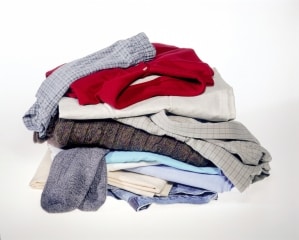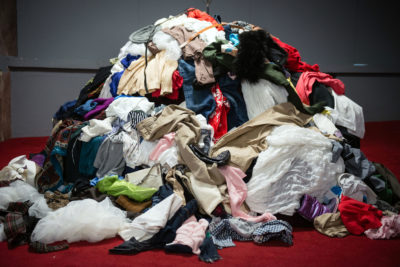Textile recyclers and charities have revealed they are facing increasing competition for already-scarce material from a growing number of cash-for-clothing operators who pay money directly to the public for material.
High prices for recovered textiles are understood to be fuelling the phenomenon, that involves companies both paying for clothes collected directly from households and opening shops and depots where they buy the clothing off members of the public

A number of more-established commercial textile recyclers are offering money for textiles directly to the public, such as European Textile Recycling, which has seven Cash4Clothes shops in the West Midlands, and WH Tracey, which pays for textiles dropped off at its Bury depot.
But, they have been joined by less well-known names, with a snap survey by letsrecycle.com revealing at least three operations offering money for clothing delivered into shops or depots and a further four offering to collect and pay for textiles from householders.
All are offering in the region of 50 pence per kilogram for material, roughly in line with the current market price of between 460 and 610 per tonne of charity rags.
The increasing scale of the issue was highlighted by one textile recycler, who wished to remain anonymous. He told letsrecycle.com: We are seeing more of these companies and it is a growing issue.
And, another recycler commented that the development of cash-for-clothing may see more thefts from banks.
He said: Ive also heard that where these shops have set up there have been increased instances of people jamming open banks.
The source also raised specific concerns over how people selling material to the shops, depots or collectors would have got hold of it in the first place.
I suspect the problem is that when you go into those shops theres no check on who you are. They dont check the bags and just give you cash, he said.
Charity shops
Warren Alexander, chief executive of the Charity Retail Association (CRA), which represents over 300 charities nationwide, also reported an increase in the number of cash-for-clothing shops. He said: Relatively recently there seem to have been more examples of it.
He acknowledged that it created issues for the Associations members. He explained that it was one of a number of pressures that was forcing CRA members to become more innovative in how they secured clothes donations from members of the public.
However, he questioned how viable paying cash for clothing directly to the public would be. How sustainable it is in the long term I dont know, he said. Prices are high and that does mean there are going to be people out there trying to make a quick buck but theyre going to have their own costs though.
Impact
These sentiments were echoed by an anonymous textile recycler, who said: I do not feel they are making any significant impact – they rely on the public phoning them up, they would need an awful lot of phone calls from one area to make a journey worth while, my feeling is that this way of sourcing stock will die out as quickly as it started.
We are struggling to collect enough rag to make collections viable and we collect from many shops on each run we make, if these companies are not also collecting from shops at the same time, the logistics alone will cripple them.
Instead, he pointed to the more established textile merchants buying clothing directly as a trend that could become more popular, but again questioned whether members of the public would go out of their way to sell just a couple of bags of clothing for 7-8.
They’re more likely to support a local charity shop that is conveniently sited close to home, he added.
Alan Wheeler, national liaison manager at the Textile Recycling Association, could not comment on the specific issue but highlighted the work the association was carrying out with the City of London Police to tackle the involvement of criminal gangs in the textiles sector.
This was among the subjects discussed at a January 2011 round-table meeting chaired by the minister for civil society, Nick Hurd, which sought to address the issue of bogus and misleading textile collections (see letsrecycle.com story).











Subscribe for free